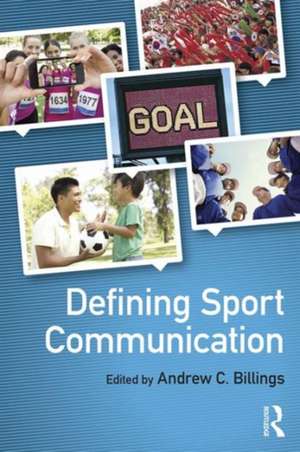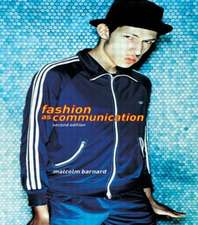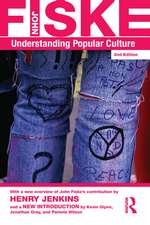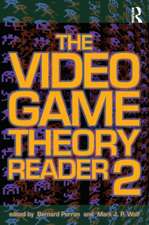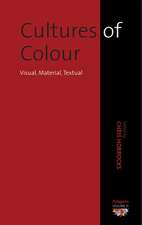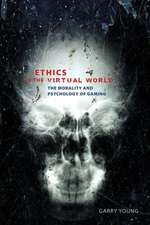Defining Sport Communication
Autor Andrew C. Billingsen Limba Engleză Paperback – 28 oct 2016
Defining Sport Communication is a comprehensive resource addressing core topics and issues in sports communication, including intergroup and interpersonal communication, gender and LGBTQ concerns, media studies, and organizational communication. It provides foundational work in sports communication for students and scholars, reflecting the proliferation of research published in recent years and the ever-increasing interest in this area of study.
Bringing together scholars from various epistemological viewpoints within communication, this volume provides a unique opportunity for defining the breadth and depth of sports communication research. It will serve as a seminal reference for existing scholarship as well as providing an agenda for future research.
| Toate formatele și edițiile | Preț | Express |
|---|---|---|
| Paperback (1) | 451.32 lei 43-57 zile | |
| Taylor & Francis – 28 oct 2016 | 451.32 lei 43-57 zile | |
| Hardback (1) | 1328.55 lei 43-57 zile | |
| Taylor & Francis – 20 oct 2016 | 1328.55 lei 43-57 zile |
Preț: 451.32 lei
Nou
86.39€ • 93.87$ • 72.61£
Carte tipărită la comandă
Livrare economică 21 aprilie-05 mai
Specificații
ISBN-10: 1138909602
Pagini: 370
Dimensiuni: 152 x 229 x 27 mm
Greutate: 0.5 kg
Ediția:1
Editura: Taylor & Francis
Colecția Routledge
Locul publicării:Oxford, United Kingdom
Public țintă
UndergraduateCuprins
Table of Contents: Defining Sport Communication
Introduction. Andrew C. Billings, University of Alabama
Unit I. Humanistic Approaches to Sport
Chapter 1. Sport as rhetorical artifact (Michael L. Butterworth, Ohio University)
Chapter 2. Sport as critical/cultural studies (Daniel A. Grano, University of North Carolina-Charlotte)
Chapter 3. Sports and the communication of ethics (Lawrence A. Wenner, Loyola Marymount University)
Chapter 4. Sport and ethnography: An embodied practice meets an embodied method (Robert Krizek, St. Louis University)
Chapter 5. Sport and political communication/Political communication and sport: Taking the flame (Davis W. Houck, Florida State University)
Chapter 6. Sport as gender/feminist studies (Lindsey J. Meân, Arizona State University)
Chapter 7. Sport and race: A disciplinary history and exhortation (Abraham I. Khan, Pennsylvania State University)
Chapter 8. Sport and GLBTQ issues (Edward M. Kian, Oklahoma State University)
Unit II. Organizational/Relational Approaches to Sport
Chapter 9. Sport as organizational communication (Jeffrey W. Kassing, Arizona State University & Robyn Matthews, Arizona State University)
Chapter 10. Sport as intergroup communication: Fans, rivalries, communities, and nations (Howard Giles, Univ. of California-Santa Barbara & Michael Stohl, Univ. of California-Santa Barbara)
Chapter 11. Sport as interpersonal communication (Paul D. Turman, South Dakota Board of Regents)
Chapter 12. Sport as family communication (Jon F. Nussbaum and Amber Worthington, Penn State University)
Chapter 13. Sport as health communication: Intersections, theories, implications (Kimberly L. Bissell, University of Alabama)
Unit III. Mediated Approaches to Sport
Chapter 14. Sport as international communication (Simon Ličen, Washington State University)
Chapter 15. Sport as journalistic lens (Steve Bien-Aime, Pennsylvania State University, Erin Whiteside, University of Tennessee, & Marie Hardin, Penn State University)
Chapter 16. Sport as audience studies (Walter Gantz, Indiana University & Nicole Lewis, University of Miami)
Chapter 17. Sport as entertainment studies (Arthur A. Raney, Florida State University)
Chapter 18. Sport as broadcast studies (R. Glenn Cummins, Texas Tech University)
Chapter 19. Sport as social media networking studies (Jimmy Sanderson, University of Arkansas)
Chapter 20. Sport as gaming studies: Videogames as an arena for sport communication scholarship (Nicholas D. Bowman, West Virginia University & Andy Boyan, Albion College)
Chapter 21. Sport and advertising (Michael B. Devlin, DePaul University)
Chapter 22. Sport and public relations (Kenon A. Brown, University of Alabama & Thomas E. Isaacson, Northern Michigan University)
Notă biografică
Descriere
Defining Sport Communication is a comprehensive resource addressing core topics and issues in sports communication, including intergroup and interpersonal communication, gender and LGBTQ concerns, media studies, and organizational communication. It provides foundational work in sports communication for students and scholars, reflecting the proliferation of research published in recent years and the ever-increasing interest in this area of study.
Bringing together scholars from various epistemological viewpoints within communication, this volume provides a unique opportunity for defining the breadth and depth of sports communication research. It will serve as a seminal reference for existing scholarship as well as providing an agenda for future research.
